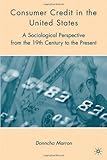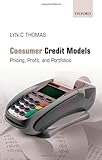Consumer Installment Loan Process Demonstration
Debts are inevitable especially in our dwindling economy. This wouldn’t have happened if you were watchful of your finances though. However, you can always get some help to get back on track.
There are loans when you’re strapped for cash, and these loans are considered debts from financial institutions. Financial institutions let your borrow money for your own personal use, however it can serve you.
Consumer contract financing or installment financing lets a business to have an abrupt increase in their cash flow through providing clients with an installment financing plan that can be very hefty.Watch this video and know more.
Categories: Loan Videos Tags: Consumer, Installment, loan
Consumer Credit in the United States: A Sociological Perspective from the 19th Century to the Present
Consumer Credit in the United States: A Sociological Perspective from the 19th Century to the Present
It is commonly imagined that in recent years the rampant growth of consumer credit has lured American consumers into a crippling state of indebtedness, a state that has upended old cultural values of Puritan thrift and stimulated a frenzy of consumption. Drawing on the sociological concept of ‘government’ and informed by a historical perspective, Marron presents a much more complex and nuanced reality. From its early antecedents in nineteenth century salary lending and instalment selling, she shows how the emergence and growth of consumer credit in the United States have always been subject to shifting regimes of control and regulation.
List Price: $ 89.00
Price:
Categories: Loan Products Tags: 19th, Century, Consumer, Credit, from, Perspective, Present, Sociological, states, United
Consumer Credit Models: Pricing, Profit and Portfolios
Consumer Credit Models: Pricing, Profit and Portfolios
The use of credit scoring–the quantitative and statistical techniques to assess the credit risks involved in lending to consumers–has been one of the most successful if unsung applications of mathematics in business for the last fifty years. Now with lenders changing their objectives from minimising defaults to maximising profits, the saturation of the consumer credit market allowing borrowers to be more discriminating in their choice of which loans, mortgages and credit cards to use, and the Basel Accord banking regulations raising the profile of credit scoring within banks there are a number of challenges that require new models that use credit scores as inputs and extensions of the ideas in credit scoring. This book reviews the current methodology and measures used in credit scoring and then looks at the models that can be used to address these new challenges.
The first chapter describes what a credit score is and how a scorecard is built which gives credit scores and models how the score is used in the lending decision. The second chapter describes the different ways the quality of a scorecard can be measured and points out how some of these measure the discrimination of the score, some the probability prediction of the score, and some the categorical predictions that are made using the score.
The remaining three chapters address how to use risk and response scoring to model the new problems in consumer lending. Chapter three looks at models that assist in deciding how to vary the loan terms made to different potential borrowers depending on their individual characteristics. Risk based pricing is the most common approach being introduced. Chapter four describes how one can use Markov chains and survival analysis to model the dynamics of a borrower’s repayment and ordering behavior. These models allow one to make decisions that maximize the profitability of the borrower to the lender and can be considered as part of a customer relationship management strategy. The last chapter looks at how the new banking regulations in the Basel Accord apply to consumer lending. It develops models that show how they will change the operating decisions used in consumer lending and how their need for stress testing requires the development of new models to assess the credit risk of portfolios of consumer loans rather than a models of the credit risks of individual loans.
List Price: $ 85.00
Price:
Find More Credit Advance Products
Categories: Loan Products Tags: Consumer, Credit, Models, Portfolios, pricing, Profit
★ Personal Consumer Loan Story: “I Got Control Over My Finances and My Life”

Watch this video and see how it proves that finance management practice for personal debt relies on great financial principles as well as a good control over human nature. Personal installment loans are a straightforward form of credit helping consumers make both ends meet when they are in dire need of help.
Spare some time and be inspired to learn the ways to take control over your own finances.
Categories: Loan Videos Tags: Consumer, finance management, Personal Loan, Story
Consumer Credit Expert Speaks About Small-dollar Personal Loans

www.AssociationForResponsibleLending.org The Foundation for Safe and Responsible Lending Consumer installment loans, long considered the foundation for safe and responsible lending, are in vogue again. This proven money management practice for personal debt is based on sound financial principles and good insight into human nature. Personal installment loans are a transparent, affordable and disciplined form of credit which helps consumers meet important economic needs. In critical circumstances, these loans also help smooth out income fluctuations and disruptions from unexpected events like car repairs or medical expenses. An installment loan provides a properly structured and timely repayment schedule based on an individual’s actual ability to pay. It also inherently creates the satisfaction associated with achieving important financial goals through the practice of personal responsibility. Protecting Consumer Access to Responsible Credit Consumers Making Good Decisions for the Right Reasons The Same As It Was Over 100 Years Ago With traditional installment loans, the process today is the same as it was over 100 years ago. The industry provides high quality loans in a strongly regulated marketplace with all appropriate consumer protections—without having to rely on taxpayer subsidies. Clearly, it is imperative to keep a healthy, diversified private enterprise consumer loan industry available in this country. When lending is available through private enterprise, we …
Categories: Loan Videos Tags: About, Consumer, Credit, Expert, loans, Personal, Smalldollar, Speaks
What fees are charged when you use consumer credit?
Credit cards are often seen as fee filled debt traps due to high fees for doing everything from cash advances to late payments. People who are against credit cards tout them as evil and something that should be avoided at all costs. But what many people don’t realize is that if you pay your balance off in full each month, most credit cards have no fees.
However many Americans don’t pay off their credit cards in full each month and often incur fees that can be avoided.
Some of the common fees that are charged on credit cards are as follows:
Interest rate: This is the APR charged for all purchases and calculated daily that one will pay on every purchase if the bill is not paid in full by the due date. Most cards offer grace periods allowing the customer around 20 days from purchase date to pay the bill before incurring the interest. Interest rates on cards can range from low- 4 or 5% to extremely high 22%, with some cards having default rates as high as 39% if you miss a payment.
Late Fees: Most cards have late fees of around 15-39 dollars if you are a day or even hours late on a credit card payment. These can be avoided by paying early, paying online, or setting up automatic payments from your checking account. Only the minimum payment is required to avoided this fee.
Over Limit Fees: Most cards also charge a fee if you go over your credit limit; often they will authorize the purchase but charge a hefty fee around the same as a late fee. Kind of like an overdraft charge.
Cash Advance Fees: All cards charge a fee that is a minimum amount or set percentage of the amount you take out as cash. On top of this set fee, interest on cash advances is often higher and has no grace period.
Annual Fees: This is a fee charged yearly for membership to the credit card. Some companies charge this and in return the member is given perks, special access to travel and events, and so forth. Many people believe annual fees are a scam and more and more credit cards do not carry them.
Merchant Fees: This is the fee a credit card processor (like Visa or Mastercard) charges a merchant every time a card is swiped. The fee is generally between 2-5% of the purchase and some consumers believe this fee and increased use of credit is what drives prices up. The credit card user is not charged directly for this fee (although as stated, some merchants raise prices on all products to offset the costs since charging more for credit only is illegal), and often this fee is used to pay for rewards program payouts on credit cards. This is also a way for credit card companies to profit off of ‘deadbeats’ or those credit card users who pay their bills off in full every month and thus incur no interest charges.
With all these fees, credit cards may seem like a rip off. However most if not all of these fees can easily be avoided. Treat a credit card as a tool to build credit and get some rewards back, not as extra money. By paying the bill in full every month you’ll avoid interest charges completely. Make sure you pay in full on time to avoid late fees and never go over your credit limit. Avoid cash advances at all costs and shop around for the perfect credit card. Annual fees are seen as a rip off, many great rewards cards offer no annual fee so if you use credit responsibly you can pay nothing and get all the benefits of credit. Besides, the companies profit either way, because everytime you swipe they take a little off the top.
Written by MaxwellPayne
Categories: Loan Articles Tags: charged, Consumer, Credit, fees
Personal Consumer Installment Loan Story
www.AssociationForResponsibleLending.org
The Foundation for Safe and Responsible Lending
Consumer installment loans, long considered the foundation for safe and responsible lending, are in vogue again. This proven money management practice for personal debt is based on sound financial principles and good insight into human nature.
Personal installment loans are a transparent, affordable and disciplined form of credit which helps consumers meet important economic needs. In critical circumstances, these loans also help smooth out income fluctuations and disruptions from unexpected events like car repairs or medical expenses. An installment loan provides a properly structured and timely repayment schedule based on an individual’s actual ability to pay. It also inherently creates the satisfaction associated with achieving important financial goals through the practice of personal responsibility.
Protecting Consumer Access to Responsible Credit Consumers
Making Good Decisions for the Right Reasons
Categories: Loan Videos Tags: Consumer, Installment, loan, Personal, Story


